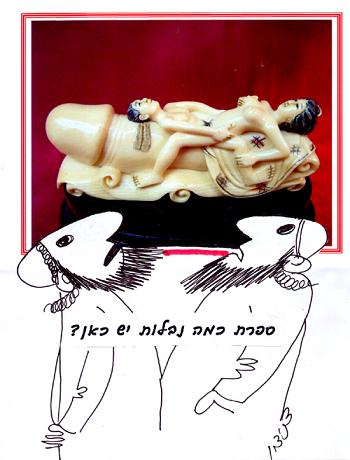
First let us explain that in the time of the Holy Temple they customarily ate from within a state of purity. Anyone who became impure had to immerse in a ritual bath to “purify” himself and so eat within a state of purity. One could become impure by, for example, touching an animal which had died without ritual slaughter or an insect, based on what is written in the Torah: “A person who touches any insect…shall not eat of the sacred donations unless he has washed his body in water” (Leviticus 22:5-6). But it not only a person who has touched these things who is impurified. According to that same set of laws, one who has carried the meat of an animal which died without ritual slaughter or an insect, even if there was no direct contact (for example, he found an insect in a basket or a box which he had carried) has become similarly impure. But impurity within the body, such as in the digestive system or within a woman’s womb, is not considered impurifying.
The Sages asked: What is the rule if the meat of an animal which has died without ritual slaughter is found in a woman’s cervical canal? Is the woman impurified? How is it possible that a piece of such meat is in a woman’s cervical canal without her having touched it? That could happen if, for example, another woman inserted the meat into her cervical canal. Now the question is that on the one hand the woman herself did not touch the meat, only her cervical canal, which is inside her body, did, and impurity found within the body is not impurifying. On the other hand, the cervical canal is not truly considered to be within the body, since one can entered it with one’s hands, so it may be considered an organ which does impurify, as though she carried and picked up the impure thing.
Therefore the Sages were divided on this matter. Rava opined that the woman is impure and Abaye opined that she is pure.
(Babylonian Talmud, Tractate Niddah 42b)
The Talmudic text:
Is impurity in the cervical canal considered absorbed, or just impurity of a concealed place? What difference does it make? If one woman stuck a piece of a dead animal in the cervical canal of another woman, if it is absorbed, it is not impurifying at all, but if it is a concealed place, it impurifies the woman through carrying. Abaye said “It is absorbed”; Rava said “It is a concealed place.” Rava brought support for his position by stating that were it not for the verse [which impurifies a woman who has relations], the seminal ejaculate would not impurify her, for it is the impurity of a concealed place; it is a Torah decree that she is impurified even so. Abaye rejected this and stated: if not for the verse, the ejaculate would not impurify her, it absorbed; even if you would say that it is not absorbed, but rather a concealed place, it would not impurify her [if not for the verse].
